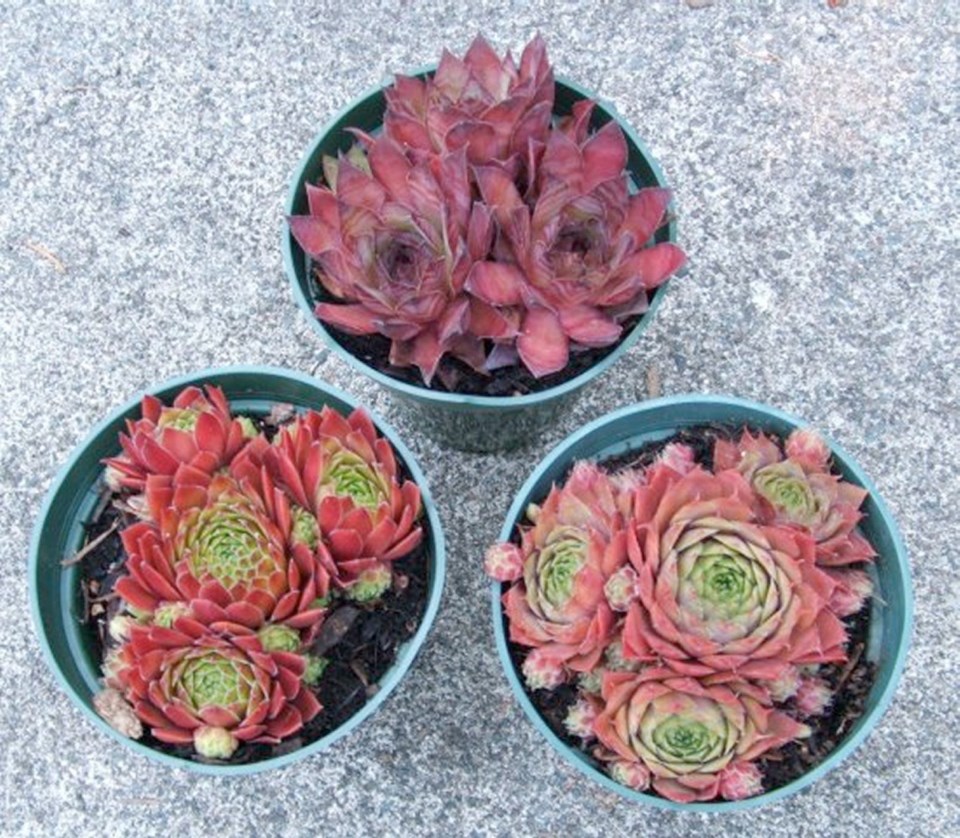Dear Helen: A friend has given me a container filled with what I think is a “hen and chicks” planting. How do I keep this lovely planting safe over the winter here in Victoria? Does the pot need to be put in the garage or brought indoors?
M.B.
First, confirm the identity of the plants. Check out “Sempervivum” on a search engine and compare your plants with the photos you find.
Sempervivum is a popular succulent with evergreen rosettes of leaves surrounded by smaller rosettes — the “chicks.” They are very hardy, low-maintenance plants. Sempervivum means “always living.” The only real danger to their survival is soggy soil.
In my experience the plants are best left outdoors, but protected from rain. I’ll sometimes winter my potted plantings on outdoor shelving made of solid boards, or under the eaves, against a house wall.
Sempervivums are interesting, historic plants. Two types are commonly available. Cobweb hen and chicks (Sempervivum arachnoideum) has fine silvery hairs. S. tectorum (of roofs) is the old-fashioned kind that can be seen in Europe growing in the gravel of rooftop gardens. In past times, the plants were regarded as an effective safeguard against lightning when grown on roofs.
These are wonderful rock garden and container plants, available in a variety of colourings in the bronze to red range as well as in green. Starry flowers in shades of pink appear in summer.
Propagation is easy. Pull up some of the chicks and plant them wherever you’d like to start up a new colony.
Dear Helen: Bindweed has spread from my neighbour’s front yard into my garden. All summer I’ve been pulling the vines away from my plants. How can I stop its continuing spread?
L.L.
Perennial morning glory (bindweed) is one of the most difficult weeds to control. The best to be hoped for is to weaken it by keeping any growth, as much as possible, from seeing the light of day.
Apart from smothering it for two or three years with black plastic covered with a thick mulch, the only way to suppress bindweed is to pull up shoots as they appear.
Unfortunately, this takes time because the plants have food storage reserves in deep rhizomes. Their root systems are extensive and, if allowed to, the plants self-sow profusely. Never let stems develop to the flowering stage.
If you feel comfortable about it, consider approaching the neighbour whose yard is the source of the bindweed and suggesting the use of the black plastic and mulch method of eradication, at least in a wide swath beside your property line.
Dear Helen: Several Alberta wild rose plants, given to me two years ago, have grown well in my garden but have never produced flowers, despite being fertilized with a bloom-promoting product. The plants were dug from the wild.
R.F.
It often happens that native and wild plants transferred to a home garden setting fail to duplicate the growth and flowering habits they display in their native locations. Home garden conditions are usually too cushy for them.
Rosa acicularis (prickly rose, wild rose) is the provincial flower of Alberta. In its native habitats the bright pink, fragrant flowers begin appearing in late May and continue through the summer.
These wild shrubs require no special care. They are drought tolerant and need a minimum six hours of daily sunlight. Such plants are best located at sunny, dryish edges of home gardens, where they are rarely watered (once the plants are established).
Garden Events
Tool sharpening. Russell Nursery, 1370 Wain Rd. in North Saanich, is offering a workshop on tool sharpening on Saturday, Oct. 13, at 10 a.m. and 1 p.m. In this hands-on workshop learn how to take apart, clean and sharpen hand pruners and other pruning tools, and how to sharpen spades and shovels. Bring one or two tools to work on. Cost is $20, plus GST. Register by email at russellnursery@telus.net or by phone at 250-656-0384.
Year Round Harvest. Registration is open now for Linda Gilkeson’s Year Round Harvest for the Urban Garden course at the Horticulture Centre of the Pacific, 505 Quayle Rd. in Saanich. The 10-session course on Sundays begins in January with a session on garden planning and seed starting. Cost of $565 for HCP members, others $720, includes textbook and handouts. Details at hcp.ca. To register call 250-479-6162.



